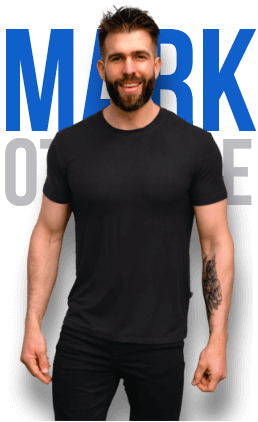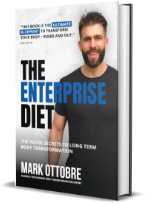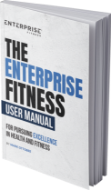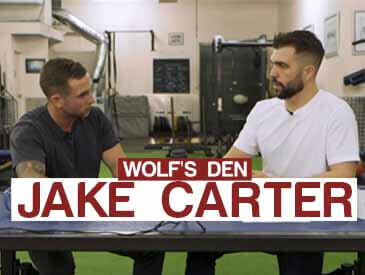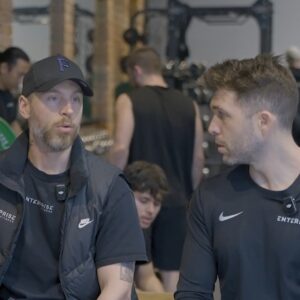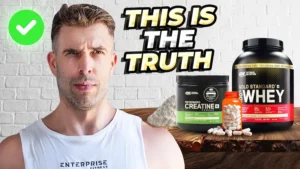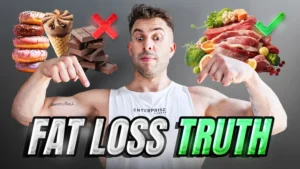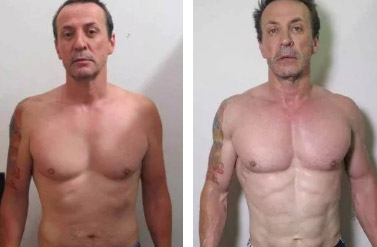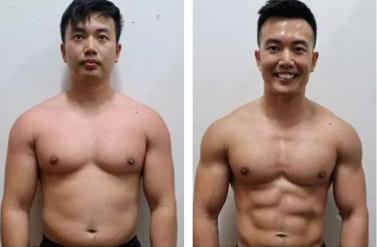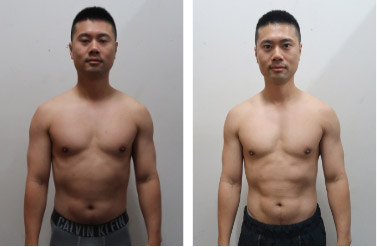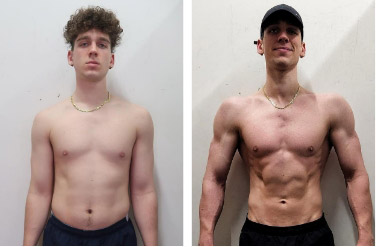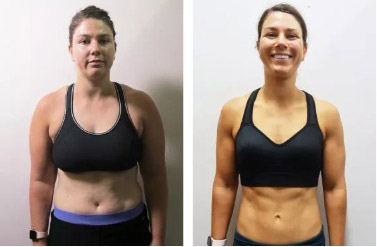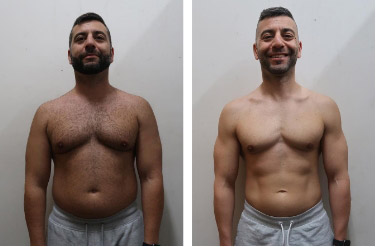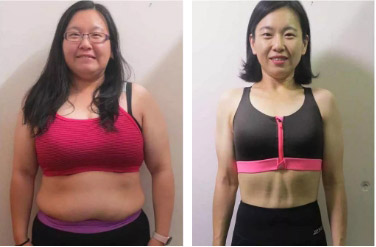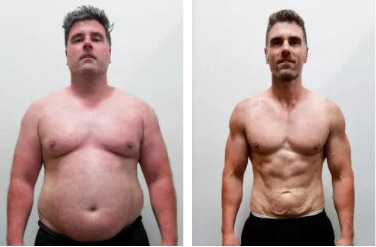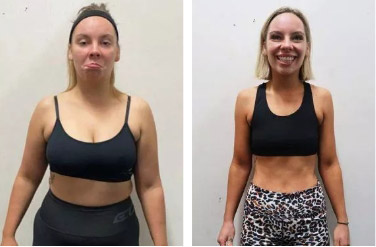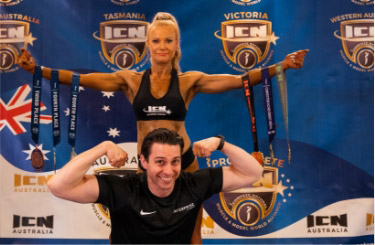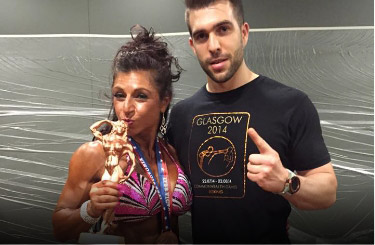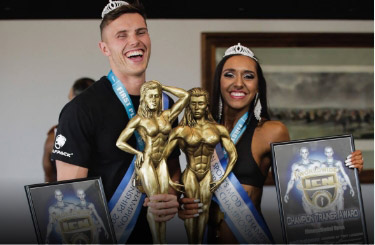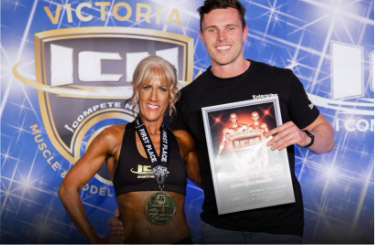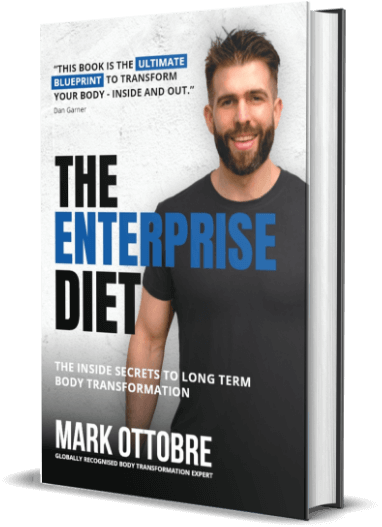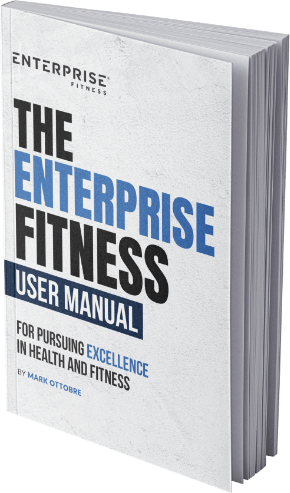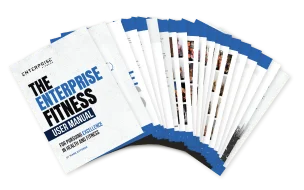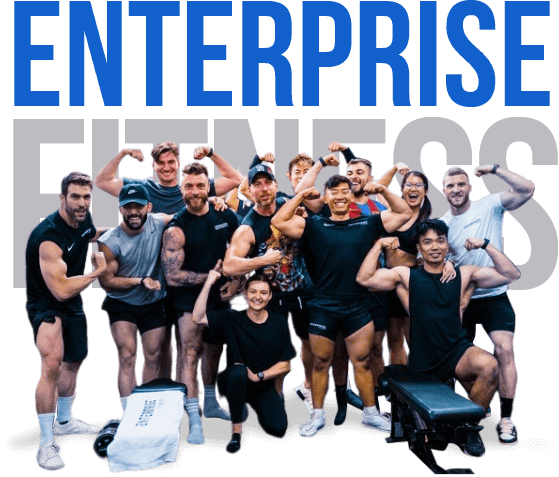In this episode, Mark is joined by Enterprise Master Coach and Nutritionist, Marshall Tan.
These two get into some interesting and personal conversations on their beliefs and battles with food and the whole diet industry.
Topics include:
- Addressing diet cultism and their leaders
- Eating disorders amongst physique competitors
- The cultural connection to food and why it’s still important
- Addressing diet confusion; how to simplify choice
- Calories, Clean Eating and Intuitive Eating, the juncture point
- Plus a bonus Q&A on fat burners and other hot topics
Between Marshall and Mark, they’ve tried just about every diet and have definitely had to ‘learn the hard way.’
Tune in to hear their war stories and nutritious conclusions on breaking diet dogma.
Available on iTunes | YouTube | SoundCloud.
Watch on iTunes and SoundCloud:
Related Posts
- Wolf’s Den With Hypnotherapist Forest Toime: Self-Sabotaging Your Diet
- The Whole Soy Story with Kaayla Daniel
- An Adult Conversation About Going Vegan & Eating Meat
Transcript to Wolf’s Den, Breaking Diet Dogma
This transcript may contain errors:
– Hey y’all, Please welcome to the pews. What do we got here? And people from world all over, are coming to see Welcome to the show that punches you in the face with information, welcome to The Wolf’s Den. My name is Mark Ottobre, and today my guest who’s joining me is Enterprise Master Coach, Marshall Tan. Today we’re gonna be getting into the world of nutrition from university degrees. If it fits your macros all the way to intuitive eating. It’s gonna be some fun. Marshall, welcome to the show. Welcome to the den and welcome back to Australia and my friend.
– Thank you very much. It’s been quite some times, I believe four years since I actually came back to Enterprise Fitness.
– Yes.
– So, yeah.
– So you don’t know the backstory Marshall and I met, you wanted to compete.
– Yes.
– And you were 20, 20 years old?
– I think 20. Yes, and so basically we’ve known each other for eight years right now.
– Eight years?
– Yes. So it’s 2010, 2010, well, it’s 2011?
– We’re in 2020 right now.
– Well, I met you 20, 2012,
– Yes.
– 2012, 2012 yes.
– Yeah.
– So I was earlier. So you competed, you were doing your university degree at the time. Then you came to work at Enterprise. I remember our very first internship that we ran here. You looked at me and you said we are trainers from all over the Australia.
– Yes.
– You to me and said, “How come, these are all trainers?” I said, “Yes Marshall.” And you said, “How come none of them know what they’re doing?” I’m like Marshall, this is the industry right? Like we got to get the word out and you know so many years later you became a master coach here. You then went to Dubai,
– Yes.
– You went all around Dubai, you’ve had some interesting experiences even working with royalty.
– Yes I did.
– And now you’ve made your way back to Melbourne. Thanks to the COVID.
– Yes, the COVID situation. The Corona as they call it So what are some lessons that you’ve taken from Dubai?
– Well, I guess it’s the same thing where people, student people in the fitness industry needs a bit more humility and basically stay in their own lane. Actually keep learning skills there. After you qualify as a personal trainer, sorry, you’re still not qualified. You have to learn more, and things, you do not know everything. And that goes to the quote there, “The more you know, the more you know, you don’t know much.”
– Yes.
– Just to paraphrase it there.
– Yes.
– Yeah, so that would be one thing that, and many other, life lessons there in terms of self-reflection.
– So you saw that, you saw that in Dubai, as well as you saw that here, there’s a lot of say arrogance in the industry, hubris in the industry
– Huh!
– with people think they know a lot more. I mean, we saw it a lot, with, with biosignature, a lot of people would do a biosignature course. Think they understand everything about there is, about hormones. And you’re kind of trying to treat hormonal problems based of a biosignature and not looking at blood work or the Dutch test or anything like that. And really looking at the full picture which is obviously a very, very bad, you need to make sure you have a good analytic data or nominal data that you can compare against and understand what you’re doing. So you saw that in Dubai as well as here, but I’m guessing you saw it in other ways with like therapies and stuff.
– Yeah, I guess in Dubai it was actually worse off. Yeah. There are just a lot of people who are, let’s say Instagram influencers and just, have good bodies poplar, good booty, just whatever like that. And basically, and say, it would basically say I’m a trainer because I look really good and people just go to them because of Instagram following. And they have no qualifications in any manner. So basically you say, let’s say CA client or a trainer teaching the client how to squat there. And they’re not even squatting properly, not even halfway, like quarter squats, and the thing is they think that’s normal and it put it on their Instagram saying, “Look at me, training my client, doing a squat.” I’m thinking,
– This is how to squat bro.
– wow! that the audacity,
– Yeah.
– You’re making personal training horrible. Yeah.
– Well, I mean, isn’t that the case right? Like people always look at the guy or the girl with, you know, the, the abs,
– Yeah.
– or the ass or whatever it is. Where really, I think, what the measure of a coach, is in their clients. And one thing that I preach so much to all our trainers here all trainees in industries, you are a reflection of your clients. I don’t know for me, the way I built my business was in my credibility as a trainer, was, it didn’t matter if it was piggy suit never been into gym before or if it was a Janet Kane who’s won four Australian titles, I would train them to basically be like what I thought was the image of perfect training. Like my business card. So they would go in and they’ll get the squat rack, whatever they were doing, and people would go up to my clients. The Mary who’s never been to the gym before, and be like “Are you a personal trainer?” and she was like, “No, I’m an accountant.” And it was be kind of comical and they’ll be like, “Wow! you know how to squat? You know how to move? Who trains you?” And she’d be like this guy named Mark. And that’s one of the ways I’ve got a lot of clients, was simply that my clients were going into public gyms and other people were saying, “Wow! You train differently to everyone else.” But more importantly to that, I think it’s the depth of results that you’re able to achieve. A lot of people able to look good themselves and can figure out enough of what works for them,
– Yeah.
– but they can’t figure out of what works for everyone individually. And that’s the thing I know in my career, in your career and what good coaches, the telltale of good coaches is. They have so many different clients from all different walks of life. And they’re able to speak to that. That’s the magic of coaching, not just simply having some ass and tits, because that’s very, that’s very fleeting.
– Yes, exactly.
– And the other thing with like beauty for example, beauty only last for so long, right? So you gotta have substance like substance and wisdom, and actually be able to produce in. I think it is… I mean, these is the fitness market, where people are attracted to what looks good,
– Yes.
– because they wanna look better but they don’t always realize that, just by chasing that shiny flashy object or that piece of ass or that abs or whatever it is, bigger biceps, they don’t necessarily have any of the answers for you. They don’t understand the biology, the physiology, or even the coach and motivational aspects. And it’s also something to be said from a coach, that is genetically, I suppose, behind the eight ball because they have to work that much harder is to figure out all these things for themselves. And I know, I had that,
– Oh yes.
– you had that, we bad experiences, right?
– Yeah.
– And we’ve really had to figure out, like every step, it wasn’t easy for us. If we will say genetically blessed. Like in my, my, my very first bodybuilding comp, I came last.
– Yeah
– Right? It was very hard for me.
– Huh!
– And I was the fat kid at school, where all these kind of things, I had to work hard. And because of that, behind the eight ball experience, it made me a bit much better coach. Because I had to figure it out. I had to figure out for myself. And then, once figuring out for myself, if I’m my hardest client then actually everyone else isn’t, isn’t so hard. What have you found?
– Oh wow! exactly the same thing there, as in, our own challenges especially in the fitness industry there, when we were able to overcome it for ourselves there let’s say, you know, not having the best genetics not having the best knowledge or whatever like that. And when we do overcome that we’re able to actually reproduce that with other clients yourself there. And that was the magical point there because we’re so frustrated and we wanna keep growing, we wanna be better for ourselves and for all clients there. So essentially, we held ourselves to a better standard as in We know there’s a lot of knowledge that we don’t know, hence we keep learning. We didn’t stop learning.
– So, let’s get into that, right? Like the Marshall’s story, you were the typical, from what I understand, right? To paraphrase your story,
– Yes.
– and kind of check cut to the chase. You were the typical Chinese kid,
– Yeah,
– right? You were overweight,
– Yeah.
– because you were overweight, and there’s lots of things that you’re told, you’re not allowed to do. Or you had to do being a Chinese kid.
– Yeah.
– One of them was you gotta get good grades, you’ve got to do this. You’ve gonna go to uni. You found very early on that, you wanted to look in a certain way, and you weren’t popular, you didn’t have the skills.
– Yeah.
– So then you went out and you made it your mission to then learn actually nutrition. You went to get your degree. You went to university, you went the formal round.
– Yeah.
– What happened next?
– Well, what am I missing from that initial piece?
– Wow! Is that from the initial pieces is like my just starting of my life there.
– Yeah.
– So I guess it was the case of… So when I was in high school, I would finish high school, let’s say 3:00 PM, typical, right? Classic high school. Then I would actually catch a bus to the city here and do my personal training diploma or certificate with,
– [Mark] How old were you?
– I believe I was 17 or 18 then, when I was doing my year 11.
– [Mark] Yup.
– So I’ll do that. So the only reason I actually did that was because I wanted to improve myself. So that’s when actually it all started, that whole personal development as such there. I wanted to learn more about training, so I can actually improve on myself there because I had this anger or such in myself there that I just wanted to grow. I just want to learn, I wanted to be better of myself physically in that sense there. So I did that. I finished high school then finished that diploma there. So I was a certified personal trainer. And then I met you, who also as you’re doing university there. And the thing is, when I met you,
– Just to qualify
– Yeah
– for our audience, what was the university course, exactly?
– So it was a Bachelors of Human Nutrition, major, major in Advanced Physiology.
– So that makes you a nutritionist,
– Yes, it does.
– or makes you a dietician?
– Yes. I’m a nutritionist,
– Right?
– Yup. To be a dietician, you need to do your masters of dietetics do as you continue on, which is an extra two years, I believe.
– Right?
– Yep. And yeah, so like I was saying, then I did meet you. And I actually had my world basically blown because wow! I was thinking to myself, I did not know much about training after doing my personal training course there, which was a bit shocking because that course went for six months and I paid money for that. And I thought I actually knew something. And then you told me about so many other things, you basically opened my eyes and showed me, ah, there’s actually way more to personal training. And yeah, that’s where…
– So this is exactly what we’re talking about today, right?
– [Marshall] Hmm, exactly.
– Formal education how it’s failed a lot of people.
– [Marshall] Exactly.
– You know, especially in nutrition especially in nutrition, you don’t have any nutritionists nutritionists, dieticians have come through my door, seeking my help and overweight being, whatever, having all these problems, eating disorders, emotional, like that’s actually one of the biggest groups of people, who I actually found myself. I full disclosure, I didn’t go to university, right? I’m just a guy who, who loved training, who fell in love with physical culture. You were talking about how, after school you would, you would get on the bus and go do the course.
– [Marshall] Yeah.
– You know, when I was 15, 16, I remember it. I’d finished school 3:15, and I’d always try and finish, get out just a little bit earlier than everyone else. So I could catch the 352 bus from East Doncaster, secondary to Dunker, to Westfield. And then across the road, there was a gym called, Genesis Doncaster.
– [Marshal] Oh, your a legend.
– Yeah, it’s burnt down now actually,
– [Marshal] Oh wow!
– They’re building houses on it. So I would train there. And I remember like my knowledge when I started as a kid, my knowledge around nutrition, I knew nothing, right? Like everyone else you know, I thought post-workout meal was, I’m not kidding when I say this, like a quarter pounder, you get, you get a double, right? You get two, two extra bits of meat,
– [Marshal] Oh eat the protein, right?
– Yeah, you need the protein or you need chicken, or a quarter pound of like have the highest in protein at McDonald’s. So, and then from just applying and learning, trial and error. And I suppose creating my own curriculum of this is the, these are the books that I wanted to study. These are the people who I wanna emulate. So for me, it was a big influence, was the Weston A. Price Foundation. Another big influence was Jonny Bowden. I think I’ve read everything of Jonny Bowden, a huge fan. And obviously there’s been a lot of people who I just met along the way, who were personally, you know in Melbourne helped me out a lot from, you know Warren Clampit to a guy named George. It’s been a lot of people, Tony Dodie as well, just put me on the path and guided me and let me kind of figure it out, but make enough mistakes. And also that’s when I learned some of like John Dimartini NLP, cause I had my own eating issues.
– [Marshal] Yes.
– And it was the really Dimartini and the stuff with NLP, Neuro-linguistic programming they really gave me the framework to go write. All this stuff that you’re learning about nutrition. The principles are sound, but you don’t have the capacity emotionally. However, we actually want to say it to actually implement it.
– Yeah.
– And they were the skills to go, right? This is actually how you put it together. So from, from what you learned in university, look, what failed? What do you think are the failures of university?
– University, I guess. All right. So, all right. Let’s just go back to university, just walking into what you remember about university day. So for the first year you have the typical foundations for all the bachelor of science there. So you learn about the basic chemistry, biochemistry and everything like that, which you know, all right, that’s cool. But I couldn’t use that to implement being a nutritionist there. So that’s just cool to learn, just the bare basics there, but just, wasn’t fun to be honest. Then when we actually got to the point where, we’re supposed to learn nutritional knowledge there we learned through statistics basically, we weren’t, we learned about how to read papers or how to use data to actually say, all right, cool. This is how much vitamin D your body needs, or, you know there is a different types of iron in vegetables and meat, then how much is actually needed for different, different bodies in different people there or do you classic RDIs, which is your recommended daily intake there. So, alright. We’ve got just the scientific side on it and we didn’t have the application there. So we didn’t get to the mindset and sense of, alright cool, I’ve got a person who comes to me, how do I actually start? Do I throw a papers to them and say “Hey, so this paper says that you gotta do this. So you should probably follow that.” But how about knowing that person and figure out how to apply that, that’s what’s missing the bonus, because it was too scientific to an extent, I’m like yes, we need that, we need to actually know science so that when applied to basics, but then the thing is, how do we apply it to the psychology of it?
– So basically what it lacked was the art of coaching.
– The art of coaching or counseling.
– Yeah, the psychology and actually how to implement the practicality.
– The practicality.
– And that’s where, what I learned was you know, through all the things you’re looking at, the studies, looking at the science of it, really understanding the science. But I suppose where I dovetailed from where a lot of people go wrong, I dovetailed into aggressively learning about these communication methods. Even I went into like hypnosis, right? Because I was like, I need the tools to be able to better communicate to people so that I can actually get the outcome that I need.
– [Marshal] Yeah.
– And what I often find myself saying to people is, you know, you don’t need a better diet, right? If you just followed the diet that you were given three months ago you’d actually get the results that you need.
– [Marshal] Done. Just like that.
– What you need is the ability to implement the diet.
– [Marshal] Exactly.
– That’s what everyone needs.
– [Marshal] Yeah.
– Which you fundamentally saying, it’s like, it’s all very well and good to develop, like if a future macros, macros or whatever and count your calories and all these strategies, ’cause let’s face it, right? At the end of the day, calories in versus calories out, or you’re gonna keto diet, you go, if a fits your macros, or you go at console,
– [Marshal] Low cab, yeah.
– whatever it is, right?
– [Marshal] Yeah.
– They all work,
– Yes.
– because fundamentally people have had success. And I think where people get lost, is they argue on why they worked or that basically their dick’s bigger, right? This, this protocol is better than your protocol.
– Yeah.
– The reason why, right?
– Yeah.
– The reason why keto works, is because you load your calories. Or the reason why you lost 40 kilos on a vegan diet is because it’s inherently lower in calorie, right?
– [Marshal] Yeah.
– But I think what people miss, is that people are going, all right this is the set of principles, If I just, these set of principles make sense to my model of the world. If I just follow these set of principles, I’m gonna actually get an outcome, regardless of the modality. Let’s say whether it’s keto.
– [Marshal] Yes.
– Like people dismiss keto because it’s, you know, it’s only fats and you just loading calories, right?
– [Marshal] Yes. Exactly.
– It’s calories in versus calories out. But I think at this point of the game, if calories in versus calories out, like what you said about the university message like just understand the science of it, and it will happen, like that’s not, that’s not enough, right?
– [Marshal] Yeah.
– It’s not enough in a sense that, people can continue to learn, and I’ve seen again with the example of nutritionist, they go to school, they get the degree and they still struggle, because the emotional set of rules of their model of the world, that science doesn’t match. There’s not a synchronous of who they are and how they can actually implement the data.
– Yeah.
– Thoughts?
– Yep. Completely agree with that. Speaking of, you know the big day comparison there, I completely agree there. I feel as if, you know, people are just holding to themself, to a belief structure. And if you just talk about it, there’s just gonna be so aggressive about it. And it’s like, “Hey, don’t be aggressive about it. Open up your mind to know the possibilities there.” Yes you know, there is calories in calories out there, there is the you know, holistic way of eating the whole foods and such. You know, whatever works for you works for you. Perfect, but you don’t have to be too aggressive, as in like, Oh, how may I get a bit of backlash here for, you know
– [Mark] It’s fine.
– talking about the vegans or whatever like that.
– [Mark] Yeah.
– It’s like cool, there’re vegans out there, but you don’t want to do come up to me and be aggressive and tell me preach about it. You know, whatever works for you, perfect.
– [Mark] Well, I think it’s even true for like the evidence based community, right? Like, cause we were all in the evidence based community. Like, you know, you have to have 65 papers on this one thing but the truth is in the evidence based community there are papers proving against what they’re saying, right? Like there were studies showing for both sides,
– [Marshall] Yeah, always.
– Always. So to say there’s things like, evidence-based, again at this point it’s like well, my science is better than yours.
– [Marshall] Yeah.
– Therefore you should listen to my cult leader instead of your cult leader. But then, you know, and I think you saw this with the documentary, the game changes, right? So they put the documentary that game which was the vegan documentary,
– Ah, yeah.
– Where thy had Chris Kresser and James Wilkes I think it was, on the Joe Rogan show and they went back and forth. We actually didn’t want Jeremy and I, and we spoke about that podcast but the point was, you know, it was Chris versus James. Like my science is better than yours. So I know you misread the study. No, you don’t even know how to read forest plots. I know you and the other day you like, all well and good, but you’ve just confused people.
– Yeah
– Right. And then there was like, what’s his name? BioLayne, right.
– Yeah, yeah.
– And he did a critique of it, with the study
– Yeah.
– and he was really aggressive on it. And then it was like, someone else in the vegan community did another study on it. And they were really, that’s like, you’ve misread the study. It’s in a day. What they’re saying is, my science has been a bit, what you’re ultimately doing. What I think a lot of the scientific community miss, is it said appeal to that emotional, for whatever reason it’s getting the right nutritional protocol and principles and making it fit into someone’s model of the world. And I think it’s also about accepting, right? Cause to a man with a hammer, everything looks like a nail.
– [Marshall] Yeah. And it’s also about accepting that, you might be an evidence based guy, right? Like your tool, like you, I know you right. Like your tool is like, I like to count my macros. So I like to know what I eat. But it’s also accepting that you’re gonna meet people, that to them, the idea of counting macros,
– [Marshall] Oh is just horrendous.
– it does fit them out of the world.
– [Marshall] That will just kill their head.
– Right? Like it’s just, I just don’t understand numbers. I wasn’t good at math as a kid, I hate math. I hate numbers. That really sounds complicated to me.
– [Marshall] Yeah.
– It’s like, no, no, no. It’s simple, right? This is all about this. Just give me a set of rules. And that’s where they say, you know, you can eat whatever you want, as long as you don’t need carbohydrates.
– [Marshall] Yeah.
– And they’re like, “Oh fuck, I can do that.”
– [Marshall] Yeah.
– And they lose 20 kilos.
– [Marshall] Yeah, yeah yeah.
– Right?
– But it’s accepting that it’s, it’s, what people do where I think a lot of experts go wrong is they challenge that. The only reason you lost weight was because you load your calories. You know, you could actually do it and if you feature macro plan, will know the truth is, they could do it only for a fact, feature macros plan. This person, this person has a set of rules in their life that doesn’t allow them to do what you did. And you may actually go into that person’s model of the world and respect that they need same bites information your big picture concepts that make sense.
– Yeah, and of course we we’re talking about the general population here. If you’re talking to, let’s say a high-end athletes there.
– I wouldn’t even say for athletes.
– Would you say so?
– If everyone, cause I don’t know if you’ve heard the analogy of Chef baker cook.
– I believe you mentioned it, but I’ve never, go ahead. Yeah.
– So, a way to kind of think about this, is you have cooks, you have bakers and you have chefs, right? So what’s the difference between cooking and baking?
– Cooking and baking. One involves flour and bread. And the other one involves,
– It’s the mathematics of baking, right?
– Al right.
– So if, if I cook a meal, right, let’s I’m making, I don’t know some stuff, right? All right.
– Yeah.
– Put some butter on the pan. I put some carrot, put a little bit pasley.
– So, it’s to form butter,
– what it is. Like you know, whatever. I can put that meat and chicken in there. I can put some chili, Oh, that’s a bit spicy.
– Yeah.
– Maybe I put some more chicken and put some more vegetables. There’s no mathematics.
– All right, yeah. Yes, yes.
– Cooking is very free and easy. Oh maybe I’ll put some coconut in there.
– Yup.
– Like, you know always like serve for the dish.
– Yeah.
– Right? Baking has the exact formula,
– Precise
– exact time. If you put the sugar in, before you put the eggs and you put the oven on and you don’t do the right steps, I don’t know how to bake. But if you don’t do exactly the right steps at the right time, you know, your bread is not gonna rise.
– Yeah.
– You’re not gonna get the result that you want. You’re gonna have a very you know, cake that doesn’t taste quite right. It’s going to be flat. So essentially people also, I like that, right? You have people who quite, big picture.
– [Marshall] Yeah
– I think athletes, regardless of whether you’re a professional athlete or reagrdless of whether you’re just a general pop person because I know people who are not general pop who are general pop that are bakers. And you give them a macro plan
– [Marshall] Delivered.
– They’re like wow, why didn’t I know this earlier, this changed my life.
– [Marshall] Exactly.
– But then you get athletes in the same who just are not medically inclined whatsoever.
– [Marshall] Yeah.
– And you plan out their calories and they look at the sheet and it reminds them of primary school where the teacher made fun of them for not being good at maths or the kids may find it from not being good at maths. And they’ve got a lot of negative connotations and they just rule it out. I’m just not interested in this. Give me the big picture. So they’re fundamentally when you group someone into cook and baker, right. Understanding whether the person you’re working with is a cook or whether they’re a baker. On top of that, what I find is the chefs. The chefs are the ones who have been doing it for a long time, right? So you might meet a client and they’ve had maybe six other coaches before they’ve come to see you, right? They’ve been all around and they’ve trained. And they’re already at a point where they kind of know to degree what works and chefs can actually be pretty much pains in the ass to work because chefs, depending on their experience, they can actually be really easy, ’cause I know what works and they just do it. And they ’cause at the end of the day, like a five class whatever, Michelin chef, they can break the rules ’cause they know they can see this ingredient and be like you know, I’m supposed to bake this certain way but instead of baking this way, sort of adding salt in I’m going to add on it or some other ingredient right? Switch it out, get the nitric oxide, whatever it is make like cool shit happen. No one’s ever seen before. And for whatever reason they can make it work because they have that level of experience. Whereas 90% of the population that ain’t working and you see these people like in bodybuilding contest, they’re just mutants that the night before they had, a whole plate of lasagna and there is no science behind like them eating, dairy that this or whatever. And then before they go on stage, they drank a bottle of whiskey. And you’re like, this just
– Does not make sense.
– Nothing about what this person does has made sense but there are mutants and they’re able to do it.
– It works.
– ‘Cause they’re at a certain level and this is where the general population come in, where they go, oh, chef doing.
– Oh yeah no.
– No, no, no, no no. You don’t get to do what the chefs are doing. The chef doesn’t even know why it actually works.
– And it just works.
– It just works.
– Yeah.
– Right. So coming back to full circle, around like athletes in general population like I challenged the point that it’s like, well, we can start, whoever is with this kind of generalized approach nutrition, whether it’s paleo or whatever. I think fundamentally a diet needs to be hunted, fish, gathered and pluck right? I think that’s the 80% of the diet. And yes, there is wiggle room right?
– [Marshall] Yes.
– But you’ve got to be at a high enough level for that wiggle and the high level you are, the more wiggle room there is like the leaner you are the more high-glycemic high sugary maple syrup.
– Post-workout yeah.
– Yeah I mean, I love my pursuit, post-workout but you know like that’s something that you earn. Like through your lets say for example, we do to analogize this with the belt system, from white belt a black belt. You don’t expect to be kicking people’s ass wipe out, you got to earn and earn same thing with being able to add these foods back into your diet. You wanna get someone lean enough because you got to respect the, how do I say? Biology, like the things like hormonally. So things like insulin sensitivity.
– Yes.
– Right. So insulin sensitivity is a factor. But again, the calories in, and I suppose evidence-based community will say things like it’s all just about calories. If you just lower the calories, then the insulin sensitivity will improve. But it’s for me, at least, I don’t know about you. It’s not a question of all, like it’s not like I have to do this or this.
– [Marshall] Yeah.
– I can do this and I can do this.
– [Marshall] Yeah.
– I don’t have to pick and be divisive in terms of which camp that I sit down. I want to optimize everything.
– Right.
– [Marshall] Yes exactly You optimize everything.
– As best possible. What have you found?
– Well, it’s one of those things with nutrition-wise where I say optimal is relative. And I always say that. And so when someone asks, “what’s the best nutrition?” I’ll say it’s completely dependent on the person there. And yes all right cool. So we can actually fix insulin sensitivity. You can always fix, let’s say low carbohydrates, high carbohydrates, everything, depending on the person yes. But it is the psychology of it too. So let’s say all right we get a client, and let’s say somewhat obese there and it’s good for them to go on a low carb diet and to help them information and with the insulin sensitivity as well as you know cut back on calories there. But anything is if they can’t follow it is not optimal is it? So the most optimal thing would be alright, cool. Give them a bit of carbs and they can actually do it and be in a caloric deficit, actually feel better in that sense and take a little steps there. Then eventually they say, you go no carbs. We’ll go low carbohydrates there. Then I say, that’s the perfect scenario there.
– [Mark] Just to comply to trial basis. Compliancy because the thing is, nutrition is so simple. It shouldn’t be complicated in any way possible eat whole foods how freaking hard is that? I think so nutrition is easy. It’s just the compliancy. There’s so much information out there. Just confusing people being evidence-based, being low carbs being carnivore diet, being keto, being that it’s like.
– [Mark] Pecans, Vegans.
– Exactly. It’s like, which one do I pick? The general pop would see that? I say, whatever works for you. We got to figure out whatever works for you.
– Oh I suppose then the question is what works for me? How do I know what works for me?
– I mean that’s where to comes to us right?
– I’ll do the blood type diet and then you have the evidence-based saying, well, maybe it’s just all about calories and then you have the keto population or the keto group saying, “well, not don’t do that. That’s too hard.” You don’t have to weigh anything just eat whatever you want, but just like these foods. So, I think the advice like find what works for you. I mean, it’s kind of cliche.
– It’s easy, yeah I know. It’s frustrating because like how do they know that?
– Correct.
– Well, I guess the biggest advice that I could always give is stick to whole foods first because that will make life so much easier. No matter if you go in calories in calories out.
– But there’re whole foods like weetabix.
– I’m just about to jump on the table and you right now.
– No, but that is the perception.
– That is a general consensus.
– That is like whole foods include wheat and commercial milk and who knows what else?
– All right so let’s take a step back there and actually go for… So let’s redefine the term whole foods here. Let’s go for it like we said, hunted, fish, gathered and pluck.
– Thank you gentleman.
– Exactly
– Well, I didn’t know that is the Jonny Bowden famous four food groups. That’s where I got it from. Like I’m just giving credit to the master, Jonny Bowden. Now you know he’s the one who I first heard coined that term which was hunted, fish, gathered and pluck. So people sometimes think that I came up with that I didn’t come up with that. That’s Johnny diet.
– Oh yeah, the Paleo diet. Yes exactly.
– This is Johnny Bowden wrote that I think like in 2000, like we’re talking 20 years ago it was even before, I remember when he published Living Low Carb, it was a number of years ago now. But you know, he would talk about his famous four food groups being hunted fish gathered and pluck. That’s how I defined.
– And the things that actually worked so freaking well because that includes whole foods there. And the thing is let’s say hunted fish and gathered. So that’s your vegetables, that’s your protein there. And yeah, that’s basically it there. So if you’re able to have that, let’s say science will tell you most population needs more protein. Most of the population needs more vitamins and micronutrients that’s going to be your vegetables there as well as you meet that. Most people need fiber. So if you stick to that, hunted, fish and gathered, life is just going to be fairly easy. I’m just going to just put it out there. So biggest advice, stick to that.
– So the thing for you though, like, cause you’ve kind of come full circle at least I think you’ve come full circle on this, right? I think actually you’ve come full circle twice. I’ll explain what I mean.
– Okay, yeah.
– So you started off with your university, you got indoctrinated with calories in versus calories out, right?
– Yes.
– Then you met me and I was like, nah fuck that shit,
– Calories don’t count calories. I remember you told me that, you told me that. And I’m still frustrated.
– They obviously do count but I was like, I want to shake you and say there so much life behind,
– Thank you so much.
– there’s more to food than just counting calories. And then you kind of snapped out of that and you went to all right calories, I’m placing too much emphasis on calories. And then I feel like, I dunno, maybe like when you’re here and when you went to Dubai, you kind of went more into the macro, let’s count everything let’s weigh everything to the letter. And then now coming back, you’ve come to the actually a big advocate of intuitive eating.
– Now I am a very big advocate of that.
– So I suppose the question on all of that is, what prompted I suppose, for a guy who is very science based let’s look at the studies, let’s look at just calories in, let’s do the macros. ‘Cause you’ve done that, you’ve done it to a very high level and you understand it better than most experts to bring you full circle back to intuitive eating personally and as well with your clients. What’s that process? Like what prompted you? What triggered it?
– I think it was frustration of needing to count calories. So the thing is I’ve done every diet under the sun. I’ve done Atkins, I’ve done low carbs, I’ve done Keto I’ve done if it fits your macros, I’ve done carnivore for months. I’ve done literally every diet possible. So it was a case of alright, cool. I did it just to learn about it as well as to, I like this idea of, there’s something there that I could always learn. So I was trying to learn from that. And the thing is at the end of the day, it was annoying at times where you have to follow these guidelines. So that’s why I pursued…
– What was annoying at times just quantify what you said.
– It’s like so low carbs, I have to stick to low carbs all the time. Oh no there’s restrictions of sorts. You know what I mean?
– And then, you had the same thing when you went if it fits your macros?
– Yes, it’s like, oh, I got to stick to this. I got to count vegetables. I do not want to count vegetables. I just want to eat a piece of broccoli if I want to and not kinda count it.
– But you can take your ice cream if you want to, if you calculate it.
– Yeah, but the thing is, it’s not really fun doing it.
– So it becomes down to trade offs.
– Yes, there’s too much trade offs with a lot of these diets there.
– Is it perfect? ‘Cause this is exactly my point. People argue about, a keto diet is unhealthy or clean eating, right? The famous one is clean eating is an eating disorder in the eating chicken and broccoli and just wanting to eat hunted fish, gathered and plucked eating wholesome foods, that’s an eating disorder. You should be able to pick out, once a week and eat whatever you want, regardless of how healthy you are versus just count your calories and eat whatever you want. I say like both of them inherently what I think the evidence based in. if it fits your macros community forget, is that both of them they’re based on perspective like I can have the perspective that counting my calories is easier. You can have the perspective that it’s harder. I could have the perspective that actually if I choose these foods I don’t have to focus so much on counting. It really comes back down perspective. And that is what you’re saying from doing all these diet. It is the perspective. And probably in time, I’m guessing the diet that you’re doing now is kind of that center point of eating wholesome natural foods. But also calculating, but then putting it in a way and format that actually has still a bit of wiggle room.
– Yes exactly. I mean like, so right now as we speak.
– [Mark] Hybrid.
– It’s always a hybrid isn’t I mean. So I’m going to, I’m going through different phases of my life right now. So let’s say if we take one year ago, literally a year ago, pre-COVID. Yeah, I was just intuitive eating and I was fairly lean. I had my six pack abs all year round. I wasn’t even caring. And there was just intuitive eating because I know how much protein I need a palm size easy. I need some vegetables perfect. I felt like, let’s say going out for a burger I will go out for a burger and I will not complain. And I had the best relationship with food because I struggled back then we’ve relationship with food because of, what would have calorie counting oldest science-based Oh well I competed back then too. We’ll get into that later. But yeah, so that’s why I push back to intuitive eating. So let’s say right the phase right now I’m in, it’s like, all right cool, I wanna put on most size.
– Okay, if I may
– Oh yeah I’m just jumping.
– ‘Cause you just brought up something like So, we’ve got a number of clients. I’m thinking of a couple in my head right now, young girls right?
– Okay.
– And they come here and they struggle with food and they have the best intentions very intelligent, very intelligent girls. And they love their fitness. They live to like a love train when it comes to the gym, it lights them up. They love seeing their coach and they have a thousand questions on nutrition right? And they sit exactly what you just said, where they at. They have a bad relationship with food. How did you navigate that? How did you end? I mean, what year are we talking? Was this just a couple years ago? And now you’ve navigated, what are the steps? How does someone get control of that?
– So that’s actually learned. So basically for me to actually answer that question we just got to go back to my history of competing. So I competed first with you coaching me then the next two competitions. So I didn’t an IVB physique show the Victorians. I got fourth place that was pretty good. Then the next one in gold coast, I got first place in the novice yeah in a novice physique .
– Amateur Olympia.
– Yeah. Amateur Olympian. So that was pretty good.
– It’s pretty big.
– Yeah, it was pretty big and big. But one of the biggest thing that I did that year in terms of prep wise, which kinda fucked up my head there and gave me a food disorder was I did a one year prep for those two shows. I had only three cheat meals and that was in the first month.
– Yeah, and none of that, I did not stray one bit and did all the cardio at the very end of the show, I had only 1,200 calories. I was doing two hours of cardio a day and two weight lifting sessions.
– [Mark] How much did you weigh?
– I weighed on stage 69.9. And I shredded glutes by all means I was
– So you were like 40% below baseline, 50% below baseline.
– Oh yeah, I was, So we were counting calories and everything like high protein, zero fat, zero carbs. So it wasn’t the best of them. So that basically gave me an eating disorder there. So after that, when I actually do eat food.
– So can I just back you up, right.
– Yeah.
– So I had a similar thing when I competed for the first time. Restricted and all that kind of stuff. So I completely get what you’re saying. So you had this super restrictive phase from the super restricted phase. You then started to go right? I have absolutely no idea what I’m supposed to eat. Like what was the next step?
– Oh right, So actually before jumping to that one. For me to actually go for one year without cheat meal basically I had to use, this is the same way I actually got out of it by the way. I had to use the DB have do motto by Dr. John Demartini there, it’s more of like, who do I have to be?
– Napoleon, it goes back much.
– Basically you have to be a person to do the actions to get the results said. Then you create a habit group there so that you usually keep doing that and that ingrained in your head there. So for me, I had to be competitor in my head. So I acted like a professional bodybuilder or professional physique there. And that’s how I actually did it. I did all the cardio without a complaint, without a tear. And I was just straight on it
– Identified as a competitor.
– Identified myself.
– I said, who is Marshall Tan? Back then he would say, I am a bodybuilder. I compete, this is who I am.
– Exactly
– This is what I do.
– Exactly. So that’s exactly what I did there. And so after that I had my first cheat meal post show there and wow, I could not control. I went straight to bingeing and everything because I lost the identity of . I’m like, if I’m not a competitor who the hell am I? Because for a whole year I told myself that and that ingrained myself that ingrained into my psychology really, really badly. So I was completely lost as to who I was there. So for me to actually get back into it, I had to figure out who I wanted to be again to do the actions and get the results there. So it was a case of creating a new habit in my head and actually learning them. It took me a while, but it was a case of self reflection and just learning to all right cool, “I don’t know who I am.” I lost that because I lost being a competitor in that whole year just pushed so hard in my hit there. So, I created a new version of myself there. So, the way I looked at foods right now, I’m not too sure who I was trying to be right now. But the way I look at food right now is food is a conduit to human connection.
– You’re right, that’s very different.
– Oh completely different. So basically…
– So you, sorry, continue.
– So basically in terms of food wise, everything is whole food. I do not eat let’s say food, that’s outside of my, let’s say whole foods whatever let’s say, I’ll go out for cheesecake, whatever it will always be for a friend and I’ll use it as connection here because you know, food is culture, food has been driven into culture.
– I mean yeah if you look for the last thousands of years, the whole thing around like sharing food is the thing that like in the evidence based community if it fits your macros a lot and even like keto and things like that tend to forget is that we are indoctrinated or ingrained almost in a biology indoctrinated but it’s actually the opposite that there’s always been every culture, a passing of, if I come to your house, I bring food or I bring a bottle of wine or I bring something that signifies a connection or thank you. And then sharing this together you’ve prepared a meal and what that preparation of the meal whether it’s Christmas, Easter or whatever pick your holiday that’s signifying, you are important to me. Please eat the food that I’ve prepared. This is an act of love. And now let’s sit down and talk about our lives and share more common interests but over this, which is actually connecting. I love it.
– Exactly. So that’s, that’s how I preach my food right now. So, let’s say if we wanna go out for a food there, I will enjoy it, I will not care for the world because this is between you and me. It’s not mean food. I have no relationship with food because we could do something else and actually enjoy each others coffee too.
– It brings you together with the people, it’s using food as a medium to bring connection into someone’s life.
– Exactly, exactly
– Beautiful. And you know what? I wanted to comment on that because I had exactly the same thing. When I competed my first time 2004 came last out of a lineup of eight people. I thought in my head, I was gonna win and I was something special. And obviously I’ve got that broken down, right? And you know, very similar, I went over a year, no cheat meals, very focused. And the diet it wasn’t calculated, the coach that I had at the time, it wasn’t a very good coach. Let’s just put it like that. And I went straight into the bingeing, straight the bingeing and really didn’t have anything but luckily I met Tony Dowdy, he helped me compete 2005. Again, I faced, after I competed, I fell into that. I am now a competitor because the thing that you’ve probably felt is when you get off stage and I was a junior I wasn’t at the natural Mister Olympia, or natural, whatever you call it,
– [Marshall] Amateur Olympia,
– the amateur Olympia, right? Like I wasn’t at that level, right? I was just at a stage show level. But I still had it and I think people have it, regardless of what level you’re at, people get that identity. And it’s that identity that triggers like I have to eat this way. ‘Cause the other thing that gets reinforced as a competitor or as an athlete, whatever it is is the minute you get off stage people then say to you. So when he competing next? When he competing next? When he competing next?
– I’ve gotta add this in. That is what we call priming in psychology. So we create a new culture of bodybuilding basically when we actually decide to compete. So we surround ourselves by people who compete too. We surrounded myself by social media. We follow people who compete in everything like that. And then we prime ourselves saying that we are a bodybuilders but we should be doing this. We should have this in this order, we should be eating five, six meals a day kind of thing. And next thing you know you got people who in the same boat they’re priming you by saying, when are you competing now? Are you sure you should be eating that cheat meal kind of thing. All right, so don’t get me wrong, body building is complete extreme sport, it can help a lot of people. But a lot of the times, I don’t think it’s a healthiest thing in terms of psychology-wise.
– Well, I think it’s, how far you push anything? Like it’s using it as a tool.
– I mean, using it as a tool, but the thing is, I don’t think it’s actually healthy there. These days, I mean, when we look at it, it’s a culture. What is culture? Culture is created by human beings. So we made it a normality to actually train six times a day which is fine, perfect. We may have normality to do that, but the thing is, they’re making normality out of this orders too.
– Well, the thing is though, when you look at culture I think you can’t really talk about culture without celebritizing in the image of what that culture is trying to portray. Now, what I mean by that is if we look at celebrities for example, let’s just say in the 80s the first person that comes to mind is like Tom Hanks not Tom Hanks, Tom cruise, right? He was the poster boy, was that movie Tom cruise, anyway, show me the money. Show me
– Jerry Maguire.
– Jerry Maguire, there we go, Jerry Maguire. Thank you. So, he was a kind of poster boy of right. This is, or even Trump back in the 80s, like this is what success is. And people would put him on the pedestal of like in business this is what you’re trying to achieve, in Silicon Valley Steve jobs, late great Steve jobs or these kinds of people, or Elon Musk, they’re put up in this celebritize and from that I think deviates or sends what people essentially try and work towards and then encourage each other to then, that’s what we’re striving for, that’s the goal. And I think in bodybuilding right, the goal in bodybuilding is very simple. Get as big as you can and get as lean as you can. If you’re a guy if you’re a girl, basically have the biggest ass possible and the smallest waist, right?
– Exactly.
– Like it’s look the most perky or look the most jerked. That is the goal. Now, we are then going to organize our actions as a culture to if that’s the goal, that’s what we hold up and anyone who achieves that, that’s who we celebrate. Then everything else transcends and goes right. If you’re not eating six meals a day then you ain’t hardcore enough. If you’re not lifting this way, you ain’t hardcore enough. I mean, you see 70 power lifting right? Like if you’re not training through an injury like say waist side who really pushed that kind of message. If you don’t train through this injury you’re not one of us, you’re not hardcore enough, right? But that’s ultimately I think these cultures get affected by I mean, culture is affected by people at the end of the day. So to say like I see bodybuilding per se, like bodybuilding, I think you can, you can partake in bodybuilding without actually having to compete. That’s using bodybuilding as a tool.
– That is a perfect, that’s an amazing way. That’s an amazing way. But I believe when you keep pushing further and further there it gets to the point where it’s like, all right cool, what is bodybuilding? Like you said, you gotta get, smallest waist get the biggest muscle have the most developed body there. But the thing is, isn’t it teaching people to actually judge themselves physically constantly being worried that the glutes are not big enough getting make sure that they’re not shredded enough there?
– Of course it is because that’s the goal, and you cannot divorce that.
– No, I know you can’t divorce, but the thing is can you divorce the idea that. The question is, can you make a healthy though? Can you make body building healthy in that sense? Is there is there any role model out there that is preaching cool our bodybuild, but I freaking love my body, I freaking love, how we’re all developing in a psychological sense too.
– You know What? I do think there is someone there and his name is Arnold Schwarzenegger, and I think the reason why I admire him as the guy in bodybuilding still? Is because he did something that most bodybuilders forget, is he used bodybuilding as the ultimate tool to then become a famous actor that made him millions and millions of dollars. But even before people don’t know about Arnie is before he even went into the movies, he was a millionaire a real estate millionaire, right? So then he went into movies because he didn’t want to be someone’s bitch. So he had all these tools and processes of being, having a great body. He used that to his advantage. He said, I want to be a famous actor. Then from being a famous actor he’s like, well, I’m going to be a politician. Then from being a politician, he was like, I’m gonna go around the world and spread my message of health and fitness and create the Arnold classic and business partners in every continent to me like people in Arnie is the greatest bodybuilder and all this kind of stuff. It’s like to me, that aside right? He’s someone who used bodybuilding to achieve and to ascend himself. And there are people who do that even in martial arts, like they great martial artists or they’re great at training or they use the principles and then they, I’ll tell you like on myself, I try and be one of these people. I think I’m one of these people because I’ve taken all the habits of being disciplined with my training, being disciplined with my food and then put it all into business. And it’s personal relationships to actually build an ascend my life because it’s the same skillset, right? So this is for me it’s like, yes, I think sometimes with bodybuilding and any pursuit you need to go so hard that you get burnt right? So it’s like you develop that disorder. And I would say for me, I wouldn’t be the person I am if I didn’t develop that disorder. And then also come on to the other side of it and go right. That there’s a line. That’s where it is for you. That’s where the line is. Now you can recognize that line. You can come back and go, right. If I cross this line here, this is where it now starts. And I’ll give you a perfect story right? This and this is where, when I figured it out. This is the line, if you cross this line here, call it imaginary whatever. If you cross this line here, now it becomes unhealthy. And I think that’s the first part of recognizing that. So for me I remember 2005, I was backstage at a bodybuilding show and I was hearing these two guys talking about bodybuilding and they’ve gone back and forth. And one of the guys said, “I’ve been competing 10 years.” And he was talking about all the shows that he won and how like and the guy’s like, you look amazing. And the guy looked, I think he’s like 40 years. He looked amazing right? You’re like this is how you want to look if you’re a body builder. And then he started saying yeah, I’ve been having a lot of problems though lately. I’ve been on antidepressants. I haven’t made my wife a constantly arguing. I don’t have a great relationship with the kids. Haven’t taken them anywhere. Haven’t been on a holiday in 10 years and basically went on, say how hard he’s job is? And he just hates life, but he’s got this bodybuilding. And I looked at myself in that locker room where everyone was getting pumped up. And I saw my future if I continued to identify myself as a bodybuilder, I could work for the next 10 years and be that guy, be unhappy guy who had all the physique but he hasn’t applied what he’s learned from bodybuilding into every other area. So I made a commitment to myself when I saw that at that time in 2005, and I said, I’m not gonna be that guy. I’m going to empower every area, I’m gonna be successful in business. I’m gonna have relationships. I’m gonna understand what finances are. I’m gonna have social interactions with people. I’m gonna go on holidays and I’m going to use this as part of my life to enhance it.
– Yeah. I completely agree. That’s fricking amazing that, but I guess the question is it’s like, alright, I truly believe you. Why can you not be a bodybuilder and go out with a good family? Why can’t you not be a body builder and have a successful gym or successful law career or whatever like that. I think is people would just limit themselves and say that if they’re a bodybuilder, they have to be a bodybuilder, they have to do only that. So, I guess the question is, how do we make sure that people don’t actually fall for the trap and get to that extreme there? Because the thing is my worry in terms of competing is people get too much of extreme there and associate themselves with one identity. I think you can be every single possible person and you get that results and do pretty good. I believe that.
– Well reiterate what you’re saying though.
– Oh yes, is like, all right. So I feel like in terms of competing, a lot of people will get into trap of them needing to be the bodybuilder to compete. Why can I not be someone Who just enjoys bodybuilding, compete and still be a good father?
– Well, I think the answer is because when you make this your priority but I think it’s this, right? comes down to this. It’s the myth in life that you can do everything. You know those, those posters of those women’s support group. And they talk about, the woman that can have it all. And I think women are victimized in this way that much more than men in the sense that you can be a have it all woman, you know, you can have the career you can have the two kids, you can have the husband you can go on the holidays, you can have all these things. You can have the great body. Truth is to have all of those things. Something’s gonna be sacrificed. You know, you’re not going to have an amazing business and an amazing relationship with your kids and amazing relationships and go on holidays. Like I’m a business owner, right? Like I don’t get all the holidays in the world. I get it. The business is burning down. I gonna be at the business. And that’s just the truth of life, with anything. So where I’m going with this is that, in anything, if you decide, I want to compete right? And you put a 100% focus and effort in that, it’s gonna impact some other area of life. It’s going to, and to say that I’m gonna compete, and I’m also gonna be as functioning high level in my business. Well, newsflash, competing you know, if you’re training to compete it’s probably going to take you two hours a day to train. Now, if you’re in a startup phase, where you want to grow your business, that’s two hours. You don’t get to train on your business. And we’re not talking even now about all the food prep that goes into that and the supplements and getting to bed early. Like if I’m in, in hustle mode I’m going to bed at 12 o’clock, I’m getting up at, you know, six, seven o’clock and I’m just working on business, right? Like training is an afterthought. If I’m competing, then training I need to situate my day around competing. So I think you can have a very disciplined lifestyle but there is a, I suppose risk in today’s society, where everything is geared towards achievement about having it all, where it’s realizing actually you know, I can probably only have two maybe three things at most, in my life. And I really actually need to decide, what are the three most important and then be okay with that. Deciding that and going right for the next 12, 20 weeks, I’ve decided that this this thing called competing, is the most important thing. I’m gonna go into that hole of being obsessive but then also understand having people there to pull you out of the hole and it does become obsessive. And that’s where people go wrong. I think personally, because if you’re going to pursue and I think like, your question is, why can’t you have both? Well, I think the reason why you can’t have both is because…
– How do you not fall into trap?
– You have to think.
– and get stuck in the hole. So you, cause you can’t get out.
– Correct, because then your identity gets entrenched. Right? But that’s way before going into it. You know, my wife Christine, she had a very good approach when she competed, right? She basically said “I wanna compete and I just wanna see how I’ll go.” And she made a decision when she competed, like she’s loved train, she’s been training her whole life. Right? But she made a decision from the moment before she stepped on stage. She made a decision that she’s only gonna get once. And if she wins, she wins. She comes last, that’s it. Like I’m doing it once. She did. She won, right? And then immediately after, she looked great on stage. She kept going. She won om miss Australia easy. She would have gone very, very far. But she decided, no I’m doing this once. And when people came to her asking, when’s your next show? She’s like, I’m not competing again. They were like, what! what do you mean? It’s like, I just wanted to see what it was about, you know. Look, she had the potential but that’s someone, you know, she took it away and like, I can, now we’ve got two kids now. She said, I’m going to compete. Like she would tell you straight out, she’s like, you’re dreaming. She, cause she’s got a naturopathic business. We’ve got two kids. You know, she got married to a husband. Who’s a full time job in himself. You had all these other things that we want to do together. So then if you gonna add competing back into that, that’s another theme that you have to basically manage. So I think it’s it’s about picking, picking which spots that you want. I hope you are enjoying this episode of The Wolf’s Den with my friend and enterprise master coach Marshall Tan. I wanna take this moment just tell you about enterprise fitness. And enterprise, we are a one to one personal training studio specializing in results. We work with people from all walks of life, now in this crazy, crazy new world that we’re all facing, you wanna make sure that there aren’t too many people in the gym and that’s something that enterprise fitness, we can guarantee. Because as I said, we do not open as a gym. We only do one to one personal training and we know each and every single person who comes through our doors. We don’t think about the hour, we think about the outcome, creating programs and plans for people to hit their goals and results. So whether it’s training, nutrition, rehabilitation, or just getting in the very best shape of your life, make sure you give us a call, At 1300 887 143 or email [email protected].
– Alright Mr. Marshall, I feel like we need to do a segment and really just like get it out in the open. Let’s do calories in versus calories out.
– Okay.
– Versus clean eating. I’ll give you my initial thoughts, right? My initial thoughts are that calories in versus calories out is overstated, in the sense that, yes we’ll fundamentally it’s true calories in versus calories out. Like you need to respect that law, that principle you can’t consume too much. But to say to people, the reason why you’re fat or unhealthy or overweight, you simply because you eat too much is ultimately a disservice in the sense that it doesn’t give any appliable knowledge to some. It tells you how someone is getting overweight, e.g. they’re eating too much or they’re doing the wrong things but it doesn’t tell you why they’re eating too much or what they’re doing. And also gives them the possibility of outcomes. So I feel that the step back from that, again, the real, I suppose committers of these and the people who offends this, is there evidence based community making it, everything is about calories in versus calories out. And you can eat absolute junk and absolute shit. As long as it hits this target. I think ultimately holistically it’s, it’s kind of like businesses getting free money, right? Like they raise all this money and they have equity. Like that can lead to problems in business because people will have mismanagement and they spend absorbent amounts of money and they don’t have a business that ever becomes profitable, and ultimately they become out of business, right? So I think in a lot of ways we need to peel it back, clean eating, on the other hand is just restricting yourself to only eating those foods. I think where people go wrong with that, is what you were saying before about the connection, is they don’t allow themselves to go to someone’s house. So go to their friend’s house and use food as a celebration means or to be able to actually connect with people. You know, they miss out on their friend’s birthday and all these things and just using food as a medium to connect one another. I think that’s where clean eating goes wrong. And I think there is a happy medium between the two. And I think we need to spend more time seeing that, like how, how you can actually use them both and principals not eating too much, understanding a little bit about macros and implementing that into the plan, but also acknowledging that it’s foods that are hunted, fish, gathering in plucked. That is what you’re gonna be eating 80, 90% of the time.
– So yes, I completely agree with your stance there actually in terms of calories in versus calories out there. There’s so much extremes there. People just eat junk for the sake of, you know, calories in because calories out, because they can get away with it. But things that only look at the internal size to how the gut is going or how their energy is going. or matter many other factors, like blood worth there. So there’s that overstatement about calories in and calories out there. And just go to extreme there. I mean, hence, you know, if it fits your macros, I’m gonna fit in some ice cream because it’s okay. But then you feel like crap. And if you really really hungry there, so.
– You’ve lived like that. You’ve done that.
– Yes. Like I said, I’ve done every diet and I was really hungry when I did, if it fits your macros. Not a big fan of calorie counting calories from vegetables, just to put it out there. Yeah. In terms of the clean eating there all right, all right. So like we said there’s also an extreme day. They don’t use food as a medium, of course eating wholesome food, eating clean food is good for you, but in where is that psychology of, you know, enjoying food with friends and family there? So that medium’s completely taken away there. So, with that being said happy medium is always the case there, you can never go to the extremes. Just because, if it fits your macros, works for someone else doesn’t mean it will work for another person, just because clean eating works with someone else. It doesn’t work for another person. You have to combine both of them to an extent there.
– Yeah, I suppose in summary for me what I’ve seen is the clean eaters and the if it fits your macros people is they’ve all changed camps, at least one, like if you do it for long enough, you’re gonna get sick of it, and you’re going to hate it, fundamentally, right? Like people would go, oh, I’m just going to eat consistently clean. They ended up doing it and they, they ended up hating it. And then once you do, if it fits your macros they’ve exactly experience, what you’re saying is they get hungry and they’re like, Oh God, you know, it’s 7:00 p.m. and I’m so hungry and they fall for the wagon too. So it’s about acknowledging that is you need to use both of the tools in your toolkit to get you where you wanna go not just choosing a camp and being dogmatic about it.
– Exactly, both cams work, combined both of them. And you have the best of both worlds there, you’ll enjoy food, you gonna actually have food for your family, you can be healthy and it all works together. So why the hell not? We’re already mocked. So right now actually you wanna talk about the culture creation. So we know culture is basically created by human beings or thousands of years and we’re constantly creating culture. And so basically in well, in society right now, or in the fitness industry they are creating a culture of needing to look a certain way and you need to eat a certain way and yes, and you need to count calories there. And I find that an enterprise fitness we are creating a culture of healthy eating and looking in looking at food in a very, very good manner there. Having a good relationship with food would be one thing hence we’re transforming lives here not just, you know, giving them results there. So what is your own perspective in that sense about how we’re doing here?
– Well, you know, I think it started, with, it started with me, the founder of enterprise. And my take on that was, I am a healthy person, who eats healthy foods, that build and nourish my body. Now, as I was talking before about culture to celebritize, that’s who I’ve lived as, that’s who I wanna be. When I look at my health and fitness as I relate to health and fitness, it’s it’s, it’s that’s my fundamental core belief. I’m a healthy person who eats foods that builds and nourishes my body from that identity. So that was my big aha moment when I became the bodybuilder and I had to live like a bodybuilder. You know, I put my hand on the Bible, which is supplement, bodybuilding magazines and I’d have my protein shake three times a day. And my nighttime protein shake and all that kind of rubbish. That’s what I was believing. And I want to change it with something else. Cause I know that with identity, you want just simply get rid of someone’s identity. You have to replace the identity and make it something else. Something bigger more exciting, but something that also is sustaining, right? So it can’t just be, you know, I’m gonna be a champion because you can be a champion. But if you win the title, then you get that, “What’s next.” So I realized that my identity needed to be self-perpetuating. I am a healthy person who eats healthy foods that build and nourish my body. There is no end date to that. That’s not a goal, like that is my goal, right? But that goal is something that I live every single day. So from that, yeah, I agree. That is what we try or succeed at. I should say we do at enterprise it’s that core belief because when you have that core belief, I’m a healthy person builds, eats healthy foods that build nourish my body, you look at food, and it’s like all right, well, I’m gonna go out with my friends and the burger. As the healthiest version of me. I really want that burger. I want to connect with my friends. While I’m a person, I actually, yeah, I can’t enjoy that burger. Cause you know what, maybe I’m gonna have a little bit extra calories but it still builds and still nourishes my body. I’m not going to overdo it. Okay. But if I had maybe two burgers, yeah that’s not what the healthiest version of me to do. And so you can make those decisions, right? You can make those decisions and they can be respected in that. But at the same time, it’s like, what are you doing 80, 90%? You’re not getting, you’re not, you’re not overweight. You’re not unhealthy because you had burger with your friends, right. It’s like one of the rules that I came up with a long time ago we should eat bad food in good company. They’ll get fat too, right? So it’s, it’s I think it’s your point. That’s how I try and live.
– Yeah, and just put it out there. Enterprise Fitness does really well of that. We actually transform lives. We create habits there which is one of the biggest thing for me to come back here because it’s such an amazing change compared to the fitness industry or what you actually see out there ’cause what you see out there. Well, typically is I’m gonna change your life in terms of giving you a good body composition. But what happens after that? Literally what happens after that? Over here what happens that is they’re freaking happy. They have the transformation they feel good and then they will always feel good. And you basically changed their lives there.
– Well, when I was, what 15, I got bitten by the training bug. And it really has kind of become my life’s mission to bite everyone. Like for me to be the actual training bug that goes around biting people and getting them infected with the love of training and not to that point, right? People have asked me almost in a derogatory way, what is a personal trainer? Like what is the role? And fundamentally the thing I’ve thought about over 10 years, like what is a personal trainer? And the definition that I’ve actually come to is a personal trainer is there to teach and educate physical culture. So then the next question is what is physical culture? Physical culture is all things that relate and pertain to a physical activity. So it includes nutrition because if you’re involved in… and it also includes communication. This is where I think like gyms are the kind of the modern church in a lot of ways because they’re the modern community center. So they’re going to a community center. People go to a gym to be physical there, to connect with people. That’s why a lot of people just love going to gyms. They don’t even work out hard. They just want to talk to people. So, I think that’s what enterprise brings in the sense of the reason why we have the success rate that we do in terms of changing people’s mindsets is because people come into our environment. This is a culture in of itself and people buy into it and they realize that you can look good, you can run a successful business, you can be a high performer and you can go out and eat a burger on the weekend too. It’s not a big deal right? Because you’re going to be back in the gym Monday morning, training your heart out and doing nine out of 10 things, right. If you do one thing wrong it’s, it’s not a big deal. And I think that’s what the culture and that’s what we bring here. And that’s why so many people fall in love with it. Already, so Marshall, we’ve got a question on our Instagram. You can ask questions at enterprisefitness.au, or you can ask questions at Mark Ottobre on Instagram. I’ve got this question from Gordon. Gordon asks, if someone who’s overweight with gut sensitivity will gut issues go away if on a calorie deficit and losing weight. So not necessarily being on, on gluten dairy free, just a calorie deficit and losing weight? Do you want to open with this?
– I think, yes, I will. I think at that point there. It depends on what they actually have. If they’ve got SIBO, if they’ve got a FODMAP problem or any of those things that you all right, the caloric deficit is not enough. It’s gonna help just a bit there for sure. But you gotta address what the actual problem is. If it’s FODMAP definitely get rid of all the fructose all right I can’t remember all the sugar, zero type of chains there. But yeah, the calorie deficit is not good enough to be honest, you actually have cut off the products that are actually causing them.
– I totally agree. if you’re lactose intolerant or you have gluten sensitivity and you’re going to a calorie deficit, you might lose weight, but you still essentially causing that system systemic inflammation. And you’re also damaging the gut, which is then putting you further behind the ball in terms of not actually utilizing those calories and in terms of recovery. So this is a way of thinking. You’ve got to look at the gut and the immune relationship. If your immune system is being triggered cause that’s ultimately like the gut is the gateway to your immune system. If you have a compromised gut then it’s making its way into its immune system. Say for like gluten, for example, you’re in triggering the immune system you’re putting on, alarms, your antibodies, your lymphocytes your cytokines to basically create an inflamed inflammation response. So again, you can be in a calorie deficit, you might lose weight but you still feel like crap and you’re still be bloated. So yeah, you have to, you have to address those foods.
– Yes, and then also there’s the thing, that the gut is the second brain of leaf, like 80% of your serotonin is actually produced from your gut itself there. So ,if you’ve got a gut problem and if you actually help let’s say gluten tolerant helped them with the gut problem as well as put him in a caloric deficit, they might actually be more compliant because of that. Isn’t there producing the right neurotransmitters for the head to actually feel good and like, Oh right I should probably fold this better because actually few much better. I’m more clearer. I can actually comply to this
– 100% and also you probably don’t have to put them in as such a reduced caloric deficit either. I’d probably be able to eat more food because their gut is better. They’re able to digest better. They feel better. They more active. ‘Cause I mean when you’ve got a gut issue, I mean, do you feel like going for a run or hitting the weights? No. You don’t. You feel, you feel like doing you’re conscious, you’re self conscious. You’re more self conscious than what you’d normally be. So yeah, I suppose summary on that. Have you got any sort of anything further to add?
– Nope.
– Well, 100% short answer is caloric deficit is not enough. You need to address the underlying issues. So the next question Marshall, and you can start with this one. What are your thoughts on intermittent fasting eight hour rule whilst training?
– Ooh I’ve done intermittent fasting before I’ve done a few variety. I’ve done the 16 eight. I’ve done the 24 hour one before that. And I say that, it’s not for everyone to be honest. A lot of times, intermittent fasting work because of, you’re cleaning your gut, You feel much better as well as you. You’re putting a bit more IGF or whatsoever they’re internal growth hormone wise. But I think it’s a lot of times it actually don’t work because you overeat when it says time to eat there. So I guess the question would be why are you doing intimate fasting? What is your actual reason there? Can you go for a different approach, which is much better than that?
– I totally agree. I think start with why, someone wrote that book. I think it’s called start with why, but yeah. Start with why like why intimate and fast? I think nine times out of 10, the question the answer is gonna be because it’s either convenient to my lifestyle or because I heard it’s a good way to lose body fat to which I challenge, both of those notions in the sense that if it’s convenient to your lifestyle, you just don’t like eating. There are food prep companies that you can get and there are, you can plan out your food of when you’re gonna eat that let’s not call it intermittent fasting, let’s just call it lifestyle design because I don’t think intermittent fasting is the right terminology for that. And with that said I think there are some studies that you’ve probably seen them more than I have. And that’s with females specifically intermittent fasting do poli over males and particularly older males. So if you are training, I think, there is something to be said about nutrient timing, even though maybe it’s not the, the number one factor though if I’m doing a workout, I certainly having my muscles full of glycogen compared to not full of glycogen, it’s a very different impact especially if I’m doing strength training as well. So, it’s not just for bodybuilding training where you want muscle glycogen. If you’re doing heavy lifts, you want a degree of muscle glycogen there, even though you would think you know, this is more of a neurological activity. So you know your three reps, for example, it’s, it’s hugely important. So I’m not a fan of intermittent fasting. It does have some validity. And you specifically as you said with gut issues, but it’s also no good. If you’re gonna eat inflammatory foods, after the fast,
– Exactly.
– you’re going to be back to square one, and with nothing to show for it. It’s not it’s not a free lunch. It’s kind of like the keynote promise or the for future macro promise. And I think that’s what a lot of these diets do, is they promise you can have all the foods you want or you can do everything you want with no drawback. Now, I think being an adult and being an adult about these things is realizing, doesn’t matter what your approach is. If you count calories if it fits your macros, clean eating, keto diet, there is a drawback, there is a drawback. So you might think I can eat for not at eight hours. No, there’s still going to be a drawback to that. And you’re just gonna accept the game that you’re playing. All right. So next question is from Sonia. Can you recommend a good supplement for fat burning for someone who trains consistently?
– No, that’s it. I think we’re done so cheers. All right, so thanks for that.
– The amount of people over the years, who I’ve got an off specific fat burner products that have lost weight like within a week, two weeks later. So I suppose let’s talk about some of the mechanics of that. I remember I had one girl came to see me, and was on like three different fat burners. And she was wondering why she couldn’t sleep at night. I was like, are you for real? I think she was on like six to 800 milligrams of caffeine a day.
– That’s the thing is just because of the caffeine. That’s the thing that we do not understand. It is because of the caffeine there.
– Yeah, but they also, they’re also saying smile. They put like nice a little bit of nice in most of the fat burners, so you get a little bit of a flush from the B3 flushing. So that’s why you feel like oh caffeine and a bit of a flush. You feel like it’s working like, Oh, I feel more vascular. It’s just the nice and right. You could buy that for like 10 bucks. But it’s not gonna help you burn fat. So let’s talk about that. Cause a lot of people don’t understand what it is. So, I mean, you’ve got your parasympathetic and sympathetic nervous system, all right? So your parasympathetic is your rest and digest. Your sympathetic is your fight or flight, right? So when you’re training, you want sympathetic to be active, right? So when you’re training, having a cup of coffee before your training, very, very beneficial into pushing you into that sympathetic drive where you can do your best, right? And also hopefully will trigger some cortisol, cortisol, help mobilize blood glucose blood glucose is then gonna be utilized during a training when you’re physically active. Now, if you take that substrate let’s say in this case, caffeine which is griner in fat burning tablets or whatever it is. In most fat burning tablets, there is some form of stimulant that goes into that fat burning tablet, right? If you have that, let’s say, you know, at intimate at times of the day, on top of if you’re having coffee, let’s say cause for your fat burner to have it at like a, I know six o’clock, well, that’s going to PM that is, you’re gonna want to be start rest and digest. You’re gonna wanna be going parasympathetic, right? And now you’re boosting that up and having, yeah, you’re boosting your over to sympathetic when you want to be resting digest, and that’s gonna make you harder to sleep, right? Because caffeine also has a half-life, and binds with adenosine in your brain. So if you’re having, let’s say a 100 milligrams at say 6:00 p.m. this what a four hour, six hour, half-life of caffeine.
– I think goes up to eight hours.
– Eight hours. So that means they’re like eight hours in, like let’s say in the middle of night, what you want melatonin to be high,
– Yeah, 50 milligrams.
– you’ve still got 50 milligrams you know, leftover fed 100 milligrams at six, 6:00 p.m. So any way you cut it, this isn’t good for sleep, and sleep if you want one supplement for fat loss, it’s sleep, right? You got it for free. You can do it. You know like, the better quality of sleep you’re gonna have, If by nothing like falls the recommend one thing that you could do aside from diet and training, right? If you just said, do one thing for for, for fat loss, it’d be sleep, sleep properly. Like get to bed on time and have eight hours a night by nine and don’t have coffee. And I know these people who say, you know I can have coffee to fall asleep, it’s fine. When it’s still affecting your sleep because the adenosine receptors and it’s still bumping you into sympathetic, right? No one is gonna get out of that.
– And this the thing, if you can have caffeine and go to sleep, you already have an underlying problem. Your cortisol is completely jerked up. Your adrenal glands is completely jerked up to the point where you actually need caffeine to try to function a bit at 12:00 a.m. at night and you still fall asleep. That is completely messed up. You probably need to check yourself in terms of seeing how your cortisol is going as well as you know, your circadian rhythm. Are you producing enough melatonin to achieve function actually be well itself there?
– Yeah, the other thing that I do in a lot of fat loss formulas is they put like tyrasine and again, tyrasine is an amino acid. It’s gonna boost dopamine in the brain. So if you’re having a night or having during the day what this can do for some people is they are quite, they’re getting anxious, when they have fat burners. Like, I know that many people who come in and like I’m hiking these fat burners, I go, yeah, are you anxious? Yeah, how’d you know, I’m like, well, this has got like you know, tyrasine and this in it and this and that and B vitamins, she was ramping that those pathways of dopamine, and this is where people think like dopamine, dopamine, and dopamine most people like already don’t have a problem with dopamine, right? Some people do some lazy people do, they need more dopamine. But if you’re, if you’re an A performer if you’re an A plus player, if you’re already got like a business and you’re hustling and hustling hard whatever, you probably don’t have a problem with dopamine. You probably actually need to settle that and getting to what’s an optimal range. Cause it’s always a bell curve, right? So if you push that, you push it to the point of anxiousness. And that’s not a place that you wanna be in terms of performance. Cause anxiousness is gonna actually impede your performance. Not actually increase it. With that said there are some things in fact, burning wise like berberine.
– Yes.
– Yes.
– Yes. There’s research for that for too, specifically for stubborn body fat. But then the things, you know, all right. So at the end of the day, fat burning supplements there are some, but you can sort your diet up. So diet up and let you sleep go really well. And you most will just lose fat by itself there. So it has no point of investing extra cash or an extra you know, money itself there, just to amp yourself up really.
– I suppose, in an eloquent way to do, “Fat loss supplements,” Is to optimize biochemistry. So it’s really then about looking at like, what is your insulin status or how, how insulin sensitive are you? Can we influence that? But it’s also like how much carbs are you having? Because there’s no point really influencing someone’s insulin sensitivity for not eating. Cause like, if I’m going to have like, say berberine for example, or one of the, the glucose disposal. Yeah, exactly. All right. All these things, like I’m not going to just have it and just not eat carbs,
– Or you can pass out.
– Yeah. I’m gonna have it. I’m gonna eat a whole bunch of Carbs. So that way I can get those cops into the muscle, right. So it’s gonna increase my insulin sensitivity to then utilize those carbohydrates and our body can uptake them and work better essentially. So I’m getting more bang for buck. So the whole thing is like if you look at cortisol, people are stressed all the time. If you’re struggling with body fat, because you’re stress. Well then the supplement regime is gonna be different. It can be things like vitamin C or adrenal herbs. You might even be…
– adaptogens.
– Yeah, exactly. So that’s gonna help your stress but by side effects, you’re gonna get a fat loss result. So I suppose in summary on this one, there’s always never a case. I don’t think there’s ever a case where I ever give someone a fat loss, fat loss supplement. I’m giving them things to support function hormonally, whether it be or…
– Fix foundations.
– Yeah. Correct. Support the foundation, with the supplements is a fat loss supplement.
– Yeah.
– Nice check it, Mr. Marshall,
– Thank you very much.
– Almost as nice as the conversation we’ve had, this last couple of hours or whatever it was, but a great conversation. Thank you for your time. Where can the folks at home find you?
– Well, my Instagram handle is that.mr.Tan. Yeah.
– Now the feedback that consistently gets given to you about your Instagram is that you have a voice like chocolate and you wake up and you just relax people with your story. So if you are an Instagrammer, make sure you check out Mr. Mr. Tan, Mr.Tan.
– No it’s, oh let me say it again, It’s that.mr.tan.
– So I just pretended to get it wrong so I could hear you talking to So I suppose in summary folks, Marshall and I over this episode, we’ve gotten into a few different topics. We both have had a lot of unique and personal experiences in this field. And I suppose you’re at the end of the day, this is a little bit of a landmines nutrition. And you do sometimes need a show power. If you will, a little guide to guide you through the jungle that can be confusion, and can be the landmines. And if you’re in a bad place within nutrition, or you’re not maybe in a bad place you want to optimize, or you just woke up after this crazy world is crazy lockdown and thought you know, I need to, I need to get myself healthy. Like if not now, when, if not me who. I need to get myself healthy, I need to do something. I need this. I want to look in the mirror, feel that confidence inside and out, I want to glow it. I want to share special something with the world, getting contact with us. We can definitely help you. This is what we do for a living. This is what I feel I’ve been put on the planet to do. I know it’s what you feel you’ve been put on the planet to do. You’re going to contact with me @markottobre Of course you can get contact at enterprise. Enterprise, Instagram is @enterprisefitnessau. Shoot us an email at [email protected]. Subscribe to us. If you’re watching this on YouTube, just hit that button below. Really appreciate this. If you’re on our iTunes, please leave us a review. Get the word out, share this episode with your friends. If you want more from us. As I said, folks, we are at enterprise fitness in Richmond, Melbourne, Victoria folks. It’s been my pleasure, until next time. Train hard, eat well and supplement smart.


